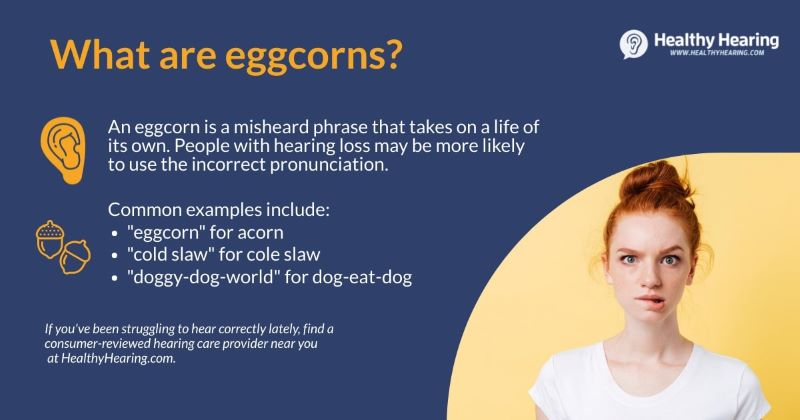Key points:
-
Eggcorns are words or phrases that are mistakenly used for similar sounding and related terms. Think "eggcorn" instead of "acorn" and "duck tape" instead of "duct tape."
-
While eggcorns may arise from mishearing, they don't necessarily indicate a hearing problem.
-
However, frequent misunderstandings and trouble following conversations may indicate hearing loss.
Have you ever said “for all intensive purposes” instead of “for all intents and purposes”? What about “biting your time” or calling someone an “escape goat”? If so, you’re not alone. These commonly misunderstood phrases are called eggcorns.
What is an eggcorn?
Merriam-Webster defines an eggcorn as "a word or phrase that sounds like and is mistakenly used in a seemingly logical or plausible way for another word or phrase either on its own or as part of a set expression."
The term was coined in 2004 after a University of Pennsylvania linguistics professor saw the term “eggcorn” instead of “acorn” in a letter from 1844.
Want to learn more? Check out NPR's "Here Are 100 'Eggcorns' That We Say Pass Mustard"

Are eggcorns caused by hearing loss?
Not necessarily. Hearing specialists regularly hear patients using incorrect words during a hearing exam, and not just those with hearing difficulties.
"It's not uncommon for patients to misinterpret or closely approximate words during a hearing exam, particularly with words that sound similar or have similar syllable structures," said Dr. Jason Wigand, AuD, CCC-A, chief audiologist at Beach Audiology Hearing & Balance Center. "This phenomenon can occur in people with both normal hearing and those with hearing loss."
Dr. Wigand explains that even in people with normal hearing, these errors can happen for several reasons—including reduced attention, cognitive difficulties, or simply because the test uses words that sound very similar.
For those with hearing loss, these mix-ups may happen more often, but for both groups it's important to consider the context and how familiar a person is with the words being tested when evaluating results.
When mishearing words can be a sign of hearing loss
Hearing loss comes on gradually and symptoms are subtle at first. When it comes to misunderstandings, the more frequent they are the more likely it is that something hearing-related is going on.
"Occasional misunderstandings are typical, especially in noisy environments," said Dr. Wigand. "However, consistent difficulty understanding speech—particularly when it happens frequently in quiet settings, during group conversations, or over the phone may indicate a hearing problem."
He goes on to mention that other signs of hearing loss may include:
- needing others to repeat themselves often,
- turning up the TV louder than others prefer
- or withdrawing from conversations due to frustration.
How hearing loss impacts speech sounds
The most common type of hearing loss is sensorineural hearing loss (SNHL). This is the type that happens with aging or exposure to loud noise, among other causes. Because this type of loss affects higher frequencies first, one of the earliest signs of SNHL is struggling to hear speech sounds, particularly consonants.
"This type of loss can damage the hair cells in the cochlea responsible for processing subtle sound details, making it difficult to distinguish similar consonants like "s," "f," "sh," "th," or "b" and "d," said Dr. Wigand. "As a result, even when speech is loud enough, it may still sound like someone is mumbling or unclear."
These difficulties can make everything from following along in work meetings to dinner out with family and friends more frustrating and less enjoyable.
When to get your hearing tested
If you are experiencing frequent miscommunications or other signs of hearing loss listed above, make an appointment for a hearing test.
When you visit a hearing care professional, you’ll likely start with a pure tone audiometry test—the one with the familiar series of beeps. This test is a standard way to measure how softly you can hear sounds at different pitches.
But when it comes to understanding how well you can follow speech, especially in real-world settings, other tests may provide even more useful insights.
Why speech-in-noise testing matters
"Word recognition testing (sometimes called speech discrimination testing) is essential for evaluating how well someone can understand speech at a comfortable loudness level," explained Dr. Wigand.
"However, more importantly, speech-in-noise testing—like the QuickSIN or the HINT test—can reveal how well a person understands speech in challenging listening environments. These tests help audiologists determine the degree of hearing loss and how well the brain processes speech. It’s not just about the beeps!”
Hearing aids help speech sound clearer
Though sensorineural hearing loss is permanent, treatments such as hearing aids can make a meaningful difference in your ability to understand what's being said.
Today’s hearing aids are designed to help you hear speech more clearly, especially in environments where background noise can make conversations difficult. They can:
- Amplify the speech frequencies you have trouble hearing
- Reduce background noise to make voices clearer
- Use directional microphones to focus on the person speaking
- Stream calls, TV, or other audio directly to your ears
Concerned your loved one has trouble hearing?
Have you noticed a parent or your spouse missing more words or asking you to repeat yourself? Not only can this be frustrating for both parties, but it's also a sign that it may be time to have a conversation with them about getting their hearing checked.
Dr. Wigand urged empathy and concern, rather than frustration when broaching this topic. He suggested something along the lines of:
"I’ve noticed it’s getting harder for us to understand each other, especially when we’re out or watching TV. And you're not engaging as much during conversations. I’m worried it might be your hearing. I want you to check it—it could help both of us."
Read more: How to support someone with hearing loss
Find a hearing provider near you
Whether you or someone you care about is showing signs of hearing loss, seeing a hearing care specialist can make a big difference. It’s a simple step that can improve communication and strengthen your connection.
Not sure where to start? Use our hearing directory to find a provider near you.




 Emily is an experienced journalist and medical content writer based in Maine. Passionate about delivering enlightening and accurate content, she is committed to empowering people to make informed choices regarding their hearing health.
Emily is an experienced journalist and medical content writer based in Maine. Passionate about delivering enlightening and accurate content, she is committed to empowering people to make informed choices regarding their hearing health.